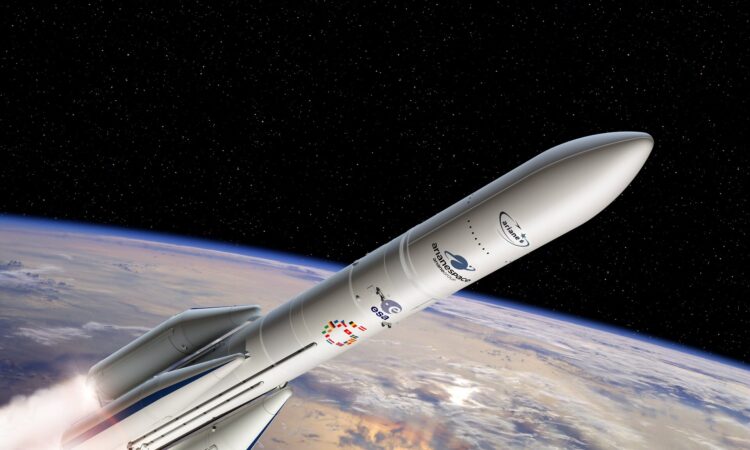
Europe has a problem — specifically, a satellite problem.
Seven years ago, in a bid to assert its independence from reliance on data from America’s Global Positioning Satellites (GPS), the European Union activated its own GPS system — Galileo. Similar in size to the GPS system, Galileo, at last report, had 28 satellites in orbit. Unfortunately, only 24 of these are still functional.
Now, the European Space Agency (ESA) is aware of this and plans to launch 10 new Galileo satellites to top off the constellation, keep it fully functional, and have spares in place for when the next satellite(s) go defunct. A new class of powerful, economical Ariane 6 rockets from Airbus (EADSY 1.36%) subsidiary ArianeGroup is slated to put the new satellites into orbit.
Unfortunately, there are currently zero Ariane 6 rockets available to launch them.
And there won’t be any Ariane 6 rockets available for at least another year.
Houston, Europe has a problem
This shouldn’t have been a problem for ArianeGroup, which initially planned to have its Ariane 6 begin flying in 2020 and certified for commercial flights shortly thereafter. More recently, the company stated that it wanted to conduct Ariane 6’s maiden flight this year, with commercial flights beginning in early 2024 — late, but perhaps not too late to get the Galileos where they’re needed not too long after they were supposed to get there.
That changed in May, however, when the ESA laid out a new plan for “key milestones” in getting Ariane 6 ready for flight. From May through November this year, ESA has a schedule packed with flight software tests, engine test firings, and even a planned launch vehicle assembly — but no actual target date for a test flight.
Crunching the numbers and inferring from past experience with similar launch programs, Ars Technica concluded last month “that the Ariane 6 rocket will not launch this year.” Indeed, the earliest that the tech publication calculates that Ariane 6 could launch is the second quarter of 2024, and “sometime next summer” — i.e., the third quarter of 2024 — is probably a more realistic best guess for Ariane 6’s maiden flight.
And that’s much too late to get the six satellites in orbit that ESA was hoping to launch this year.
What does this mean for Europe?
Assuming Ars Technica’s estimate is correct (and it does sound right to me), this means the earliest one can reasonably hope to see Ariane 6 begin launching satellites is probably the fourth quarter of 2024 — and if complications crop up, 2025 probably isn’t out of the question. Of course, by that time, there’s a good chance that enough Galileo satellites will have failed that the constellation will no longer be working at 100% efficiency.
So what’s the solution?
Last summer, we learned that the European Commission (the EC — Europe’s multinational government) had put out feelers toward SpaceX. Its aim: to secure access to SpaceX’s Falcon 9 rocket fleet as a backup plan for its Galileo launches. In April, we learned that the EC had begun laying the groundwork to have its member governments approve an “ad-hoc security agreement” that would permit hiring a foreign rocket launcher such as SpaceX to launch the Galileos — which, in addition to providing GPS service, are also used for sensitive governmental encrypted communications.
What it means for SpaceX
This seems like very good news for SpaceX — more business for it and weakened competition from Europe, where ArianeGroup sits cooling its heels as SpaceX steals market share and revenue from its rival. That revenue can then be put to good use as SpaceX pours money into developing its next-generation Starship — a gigantic, fully reusable space rocket that will outclass anything that ArianeGroup currently has on the drawing board.
What it means for ArianeGroup
The prognosis looks less healthy for Airbus’s rocket company, ArianeGroup. Starved of capital as SpaceX scoops up business in its own backyard, Ariane will have less money coming in to invest in Ariane 6 (or anything else). Worse, the money it could have gotten from launching Galileo satellites will be paying for its competitor to extend its lead!
If Starship ends up reaching orbit before Ariane 6, then by the time Ariane 6 does begin flying, it will be at least two generations behind SpaceX in rocket tech — flying smaller, disposable rockets as SpaceX shifts to larger, fully reusable rockets.
When you consider that Starship could conceivably cost as little as $1 million or $2 million to launch — a price ArianeGroup simply cannot afford to match — it really does look like the writing is on the wall. Ariane will fade away, and SpaceX will become Europe’s primary rocket launcher by default.






